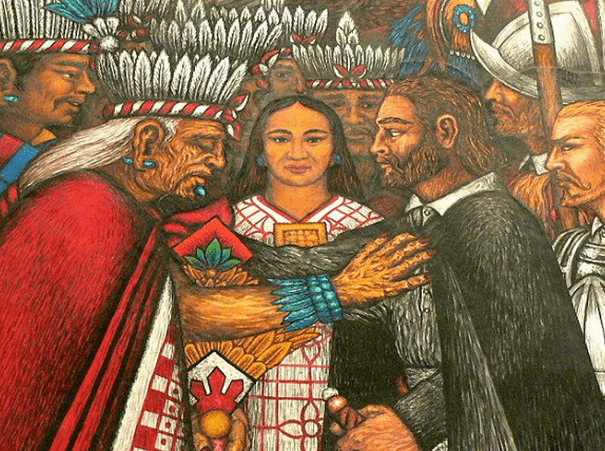Winner of the Fall 2016 StMU History Media Award for
Best Article in the Category of “People”
Best Article in the Category of “World History”
Largely due to the importation of disease and use of superior weapons, the Spaniards were able to conquer the Aztec capital of Tenochtitlan, kill the empire’s last emperor, Cuauhtémoc, and bring the Aztec empire to an end. Few know of La Malinche, the indigenous interpreter of Hernán Cortés, whose linguistic abilities were used to facilitate important conversations between the Spaniards and the indigenous leaders. Without the help of La Malinche, perhaps the Aztec empire would have survived.
Born between 1502 and 1505, La Malinche was named Malinalli Tenepal, the first part of her name being a Nahuatl term for the twelfth day of the month in correspondence to the Aztec calendar, and the second part of her name meaning “lively.” She was born of nobility in Paynala within the region of Veracruz. Her troubles started at a young age after the death of her father. La Malinche was ousted from her home to ensure her new half-brother received the inheritance of the family instead of her, since she was the eldest child. She was given to “some Indians of Xicalango.”1 Then the Indians gave her to a nobleman in Tobasco, a region in the Yucatan. When Cortés arrived to Tobasco, he was offered twenty slaves, one of them being La Malinche. Having lived in Veracruz, a Nahuatl-speaking region, and then being sold into a Maya-speaking region, La Malinche knew both languages and she was soon recognized for the linguistic talents that could benefit Cortés in his conquests.2

The few glimpses of La Malinche and how her presence as an interpreter accelerated the fall of the Aztec empire can be found in the writings of the Spanish explorers, specifically from Hernán Cortés, her “lord and master.”3 From the second letter Hernán Cortés wrote to Emperor Charles V, dated October 30, 1530, Cortés speaks of La Malinche as “a female interpreter that I had, who was a native of this country, and whom I obtained at Putunchún on the Rio Grande.”4 This confirms the vague aspects of her life that we already know. But most importantly, in this context, this letter goes on to tell of a scenario in which La Malinche saved the Spaniards from an ambush by the Cholulans. La Malinche was told by the wife of a native leader that they planned to attack the Spaniards and if La Malinche came with them, she would be protected. La Malinche delivered this message to Cortés, which ultimately led to the massacre of Cholula and provided a direct path to march towards Tenochitlan, the capital of the Aztec empire.5 This leads to the question of whether or not La Malinche was a traitor or a survivor. Did she explicitly want the Aztec empire to fall or did she just want to save herself from the carnage?
With no traces of primary sources from La Malinche herself, her story has been retold by various scholars without much consistency, nothing ever being certain. Up until the twentieth century, La Malinche was viewed as a traitor to her country Mexico. In 1861, on the celebration day of Mexico’s Independence, Ignacio “El Nigromante” Ramírez, a Mexican journalist, addressed the Mexican people by saying, “One of the mysteries of fate is that every Mexican owes his downfall and disgrace to a woman, and to another woman his salvation and glory; the myth of Eve and Mary is reproduced everywhere; we indignantly remember Cortés’s mistress and will never forget, in our gratitude to Doña María Josefa Ortiz.”6 La Malinche is seen as playing a key role in the subjugation of the Mexican peoples to Spain, while Doña María Josefa Ortiz did the contrary and liberated the country. However, many Chicana writers and modern scholars are trying to rewrite the tale of La Malinche to understand the complexities of her choices and to vindicate her. For example, Gloria Anzaldua promotes the idea that La Malinche had a “new consciousness,” that she voluntarily served as the interpreter of Cortés not only to save herself, but also because she knew that a new mestiza culture was going to be born (especially considering she had a son with Cortés in 1524).7 She made a conscious effort to exchange language and cultural aspects from each side in order to facilitate the emergence of the new mestiza society; however, with that came brutal consequences in the shape of warfare and mass death in the New World.
Whether or not La Malinche’s role as Cortés’s interpreter was traitorous, simply an effort to survive, or some other complex reason involving love for Cortés, hate for the Aztec empire for the cruelty she faced after being ousted from her home, or promotion of the new mestiza culture, no one will ever know the true story of the Indian, slave woman who traveled alongside Cortés towards the culmination of the Aztec empire.
- Bernal Castillo del Díaz, The Discovery and Conquest of Mexico, 1517-1521 rev. American ed., trans. A.P. Maudsley (New York: The Noonday Press, 1965), chap. 22-23. ↵
- Pilar Godayol, “Malintzin/ La Malinche/ Doña Marina: re-reading the myth of the treacherous translator,” Journal of Iberian and Latin American Studies 18, no. 1 (April 2012): 61-68. ↵
- Castillo del Bernal, chap 23. ↵
- Hernan Cortes to Emperor Charles V, October 30, 1520, in Letters of Despatches of Hernando Cortes, to the Emperor Charles V., trans. (New York: Wiley and Putnam, 1843), letter II. ↵
- Hernan Cortes to Emperor Charles V, October 30, 1520, in Letters of Despatches of Hernando Cortes, to the Emperor Charles V, letter II. ↵
- Rosario Pérez-Lagunes, “The Myth of La Malinche: From the Chronicles to Modern Mexican Theater” (PhD dis., Virginia Polytechnic Institute and State University, 2001), 24. Although she was of Spanish descent, Doña María Josefa Ortiz was born in Valladolid, Mexico in 1768 and identified herself as Mexican. She and her husband were both a part of the rebellion that ultimately led to Mexico’s independence from Spain in 1824. ↵
- Godayol, 68-70. ↵



230 comments
Victoria Salazar
La Malinche was a young woman who had been betrayed by her family and community time and time again. Although she was a slave, I assume she had a higher role and status being that she was an interpreter. I don’t think that she was a traitor as she did what she needed to do to survive. I wish there was more historical information on her life, but as she lived so long ago in an early civilization, it’s understandable that there is not too much to be known about her. I can see why La Malinche is seen as a traitor by the Mexican people, but I think anyone else would’ve done the same thing to save themselves.
Micheala Whitfield
Great article. That’s actually an interesting decision to discuss. Especially in this specific time frame, the violence was brutal. To survive has always been the goal. It’s sad to see such blame put on a women in a tough position. She was a slave and there was a possible chance of her being brutally tortured and murdered. Did she really have a choice? Such an interesting topic. Wonderful read.
Nydia Ramirez
This article was extremely interesting to read and actually taught me way more than any History classes I have taken in my academic experience. Every student learns about the fall of the Aztec Empire in their World History class as well as facts about Hernan Cortes. La Malinche’s story often gets overlooked and it should be taught just as much as Cortes. She was smart and tactful and her true intentions or motivations will never be known. I think there is beauty in speculation. I personally believe she was just attempting to survive and live another day.
Seth Roen
This article is a Marvelous and fascinating article, talking about a relatively mention person in history and flushed out. Imagine being both a hero and a villain for both sides of a story. However, she had to do whatever to survive a hostile region of the Americas. Given that the Aztec was not a well like a regional power, I could imagine it was not hard to decide to work for the Spaniards
Nelson R. Orringer
I have just translated a prize-winning novel from the original Spanish, “The Interpreter of Cortés: A Gift from Centla” (2010). Written by the well-known writer Carlos Laredo Verdejo, a Spaniard known for his novels, this beautifully written novel places the story of the conquest in the mouth of La Malinche herself– or as she is known in the novel, Doña Marina, as the Conquistadors called her–. I have never seen a more evenhanded treatment of the Conquest other than the present excellent article. I wonder if anyone reading me here has any suggestions about
which U.S. publishing house would be worthy of bringing the translation in print.
Emmett Pena
La Malinche led a mysterious life that historians cannot fully make out. However her role with the Spanish conquistadors led to the ultimate demise for the Aztec empire. Although faced with a life and death situation, she chose to give up her people so she can live another day. Becoming a traitor may not have been the intention, but because of her actions she is seen that way by people today.
Diego Oviedo
This article was very interesting. I had learned about this a couple weeks ago and honestly it is dependent on how one see’s it. Both sides had very solid points and the evidence was very helpful in allowing one to see from different perspectives. Going over the article and having the knowledge to see both perspectives, she put herself first in the situation and if you think about it, it would have happened either way just without her being in the equation.
Lindsey Ogle
This was a very well written article. They called her a traitor because she is seen as the reason that the empire failed, but you could also see her as a person who was betrayed from a young age and has been in survival mode ever since. I believe she was just doing what was necessary to live to see another day.
James Davis
Amazing article. I believe La Malinche used Cortes as a way to survive and even thrive somewhat. She knew what she had to do and played the game. She put her self as number one and looked out for her own well being. You ultimately have to respect that and the fact that she knew how to get in and survive.
Marcus Saldana
This article made me think in a new perspective on history. To me I consider La Malinche a survivor she did what she had to do to protect her loved ones which at that time were her kids she had with cortes. She was an outcaste to her family so it makes perfect sense that she could care less about to what would happen to them. Essentially she was never a traitor. Great article !